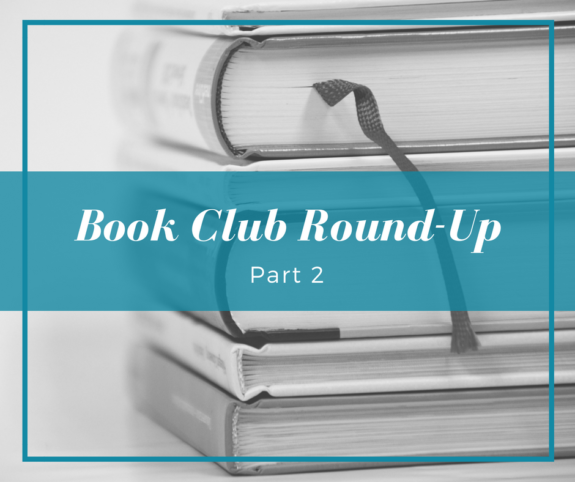Hey hey word nerds!
I’m back with another round up of DIY MFA Book Club prompts. Just in time, too, because the month-long challenge will be wrapping up soon! Join us in the Facebook group for a celebration and collective happy dance on Monday.
Before we dive into the round-up, I have to take a minute to celebrate the word-nerdy awesomeness that has been this book club adventure. When I thought up this “crazy idea” of doing a DIY MFA read-along, I had no idea it would resonate with this many people. Seriously, you guys blew me away!
Here’s a snapshot of the past four weeks. We’ve had more than 1,800 word nerds officially participating in the book club. Our Facebook group has grown to over 3,200 members and people have been actively engaging in the prompts and having conversations. Several of the prompts have gotten 100+ comments, and they aren’t just people sharing their own stuff, but talking with each other. So awesome!
Now onto the round up.
Book Club Round-Up, Prompts 6-9
As with my previous round-up I’ll be sharing my overall impressions as I read through the discussion threads for each prompt. I want to encourage you, though, not just to read through the threads in the Facebook community, but also to visit some of the links and read the responses people have posted on their own blogs. Some of those essays are quite thought-provoking.
Prompt 6: Resistance Is Your Compass
This prompt was a hard one for many writers and I understand why. Resistance is hard. It forces us to take a good look at ourselves and call ourselves on our own BS. I invite you to click the link above to the Facebook group and visit some of the links listed because there’s a lot of wisdom and insight shared in this thread.
I’m not going to pretend I’ve got it all together, because honestly I don’t. In fact, I still encounter resistance… like even right now as I’m writing this post. It’s taken me an hour to write just this little section about resistance. What I can do is share an example of when resistance pointed me not just where I wanted but where I needed to go.
A little over a year ago, I shared a very personal story that was very difficult to put into words because it hit so close to home. What I didn’t share at the time, was that I had wanted to tell that story for months—over a year, actually—but I couldn’t bring myself to do it. For me the resistance stemmed from two types of fear: fear of judgment and fear of “getting it wrong.” I felt an enormous sense of responsibility not just for telling the story, but for sharing it the right way.
Looking back, the resistance was actually a good thing because it forced me to slow down, to choose the right words, and not be impulsive in sharing. It helped me pause and think about why I was telling this story, and it made me really think about the people who would receive it, so I could tell it in a way that wasn’t just about me but that could help others as well.
Whether I succeeded in all of this is not for me to judge. But I’m oh so grateful for that resistance. At the time it was hard, like I was my story’s prisoner, hands tied and a gag in my mouth. But if I hadn’t allowed the resistance to make me pause and think, I might not have liked the result of what came out when I finally told the story. Looking back, I can say with total confidence that I have no regrets, both with the story itself and how I shared it.
Prompt 7: Let’s Talk About Supporting Characters
This prompt moved us from the mindset-related topics to the nuts and bolts of the craft. Choosing the craft prompts for the book club was a huge challenge because, as you probably already know, there’s a lot of writing craft material packed into the DIY MFA book. At the same time I knew if we did exercises on each and every topic, the book club would be b-o-r-i-n-g.
So I decided to jump in with a prompt about supporting characters and ask people to choose a favorite. Here’s my back-of-the-envelope, ridiculously unofficial tally:
- Villain – 12
- BFF – 10
- Mentor – 8
- Love Interest – 6
- Fool – 6
Several things fascinated me with this prompt. There were a lot of votes for more than one favorite. No surprise there, after all, word nerds in this community, don’t tend to enjoy being pigeon-holed into just one choice. (I don’t either.) But what interested me were the combinations because some of them were pretty unexpected, like Mentor & Fool, or Love Interest & Villain.
I also loved how some people who didn’t write fiction were able to stretch the definition of these archetypes and apply it to their writing, be it memoir or poetry. One writer—a poet—answered the prompt not by considering characters per se, but the voices that appeared in her poetry. Another writer—a memoirist—looked at how the people in her memoir could take on some of these archetypal character roles within her memoir. As always, my favorite thing is seeing how different word nerds stretch and expand the concepts from DIY MFA to work with their writing.
Prompt 8: Your Favorite Story Type
Following in a similar vein as the previous prompt, this time we looked at different types of narratives. It was a bit harder to do an unofficial tally on this one because the answers were so different, but I noted a few recurring themes.
There were definitely several votes for underdog narratives, like: rags-to-riches, little guy vs. the establishment, overcoming adversity, etc. There were also several people who said they liked stories with epic quests and a few who (like me) enjoy hate-to-love narratives where characters who appear to be opposites end up falling in love.
My personal favorite is one that I don’t think I saw mentioned: the fish-out-of-water narrative. John Gardner once said that there were only two types of stories in all of literature: the character goes on a journey, and a stranger comes to town.
Fish-out-of-water stories are interesting because they can fit in both the “character goes on a journey” category or the “stranger comes to town” camp. This type of narrative is more common with of disruptor or protector protagonists (i.e. the larger-than-life archetypes) because you have a main character who is suddenly shoved outside his or her comfort zone and has to adapt to new surroundings. If we look at the scenario from the protagonist’s point of view then it’s clearly the character going on that journey, but if you approach the story from the perspective of a character who resides in the place where the protagonist ends up, it could just as easily be a “stranger comes to town” narrative.
Prompt 9: Try a New Technique
This prompt might have been the hardest one in the series for folks to answer because it involved… actual homework. OMG, how teacher-y can I get, right?
Seriously, though, it was so awesome to see writers reporting back after trying different techniques from the DIY MFA book. As with other prompts, there were definitely a few common favorites, including the story-map technique, the revision pyramid, and the 3+2=1 story structure formula.
What I found especially exciting, though, was when writers not only did the exercises, but then stepped back and took on that “meta mindset” to understand why the exercise played out the way it did. This, of course, is the first step toward iteration and being able to adapt the exercises to your writing projects and your career goals.
This round-up ended up getting so juicy and long, I decided to break it up into two parts. Stay tuned until next Thursday when I’ll be back with the final installment featuring prompts 10-12.
Until next time, keep writing and keep being awesome!








